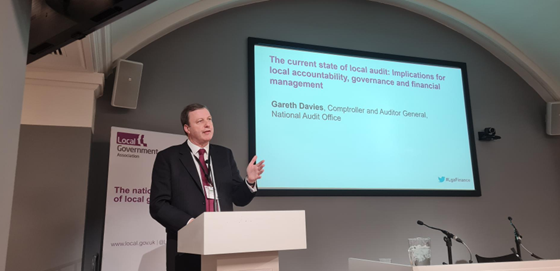Finance experts argue that the proposed ‘backstop’ for outstanding local audits is necessary but “hundreds” of accounts are expected to be qualified or disclaimed as a result.
A new proposed compulsory deadline of 30 September for all outstanding financial assessments was announced at the Local Government Association (LGA)’s finance conference this week.
Only five opinions out of the total 467 local authority audits in the UK were given by publishing deadline for the 2022-23 financial year of 30 September 2023, according to the latest figures from Public Sector Audit Appointments.
By December this has increased to 45, still representing less than 10% of local authority audits.
A local government finance expert told LGC that to meet the deadline on average 80 audits per month would need to be completed, but that it was unlikely that this target would be, resulting in “hundreds” of qualified or disclaimed opinions.
During the conference, head of finance at Swale BC, Claire Stanbury raised concerns about whether the timing of the backstop would “impact” future audits, as “the end of September is when we usually get the audit completed” for the most recent financial year, which would be 2023-24.
Section 151 Officer for Basingstoke and Deane BC Sue Cuerden told the conference that current uncertainty around the actual audit requirements has meant that the council’s auditors have not confirmed the plan for their 2022-23 audit.
She added: “This is important in the context of the consultation, that has yet to be published, regarding changes and updates the Code of Audit Practice and the proposed approach to authorities if their audits are not completed by the deadline of 30 September 2024.
“This would have a further impact on the availability of resources, with no authority wanting to have qualified accounts, and how firms will prioritise audit activity”.
Section 151 officer at Blackburn with Darwen BC Dean Langton said he feared “it is not in the interest” of auditing firms to complete accounts in September due to requirements of other clients.
Steve Wilson, treasurer for Greater Manchester CA asked for reassurance that there will be no “gaming of the system” where people put a “disclaimer rather than an actual qualification and [auditors] refuse to review the accounts”.
Chair of the Local Government Association’s resources board, Peter Marland (Lab) said the LGA is “cognisant” of challenges that disclaimers on audit reports may lead to.
Cllr Marland, who is leader of Milton Keynes council and a former accountant added that lenders may find it challenging to “judge the difference” between a well-run council and one with issues if there are lots of disclaimers or qualified opinions. He warned this could lead to higher borrowing costs.
One senior local government finance expert told the LGC that a “disclaimer” opinion would be much better than a qualified opinion for councils as it would signify a problem with the auditing system and not the local government finance.
They added: “There is safety in numbers. If there are only five or ten of authorities with a disclaimed opinions that would be bad news but if there are hundreds, it shows the system is broken. Which it is.”
Professor Laurence Ferry and Dr Henry Midgley, from the International Centre of Public Accountability (ICOPA) at Durham University Business School told LGC the need for a statutory deadline was an “unenvious situation”.
They explained that “as the audit market is now fragmented and broken” it will be “a challenge to clear the audit backlogs and meet audit deadline moving forth with piecemeal approaches”.
They advised that “a fundamental overhaul” of the audit arrangements and the wider system is needed for “value for money audit” to be “restored including with a sense of equity and financial audit reinvigorated”.
They added: “This systemic challenge will take years to address and needs urgently to be properly planned, not rhetoric and soundbites of quick and easy fixes.”
Karen Murray, partner at leading local auditing firm, Mazars, told LGC that “all stakeholders” will be working together to “put in place sustainable changes to the local audit systems to allow for more timely reporting”.
She added that it is “widely expected” that disclaimed and qualified opinions will be issued and “there is general acceptance across the sector that some form of backstop needs to be put in place in order to allow the system to ‘reset’, this is not something that anyone would advise lightly”.
Ms Murray also advised that it is “likely to take several years for some of these consequences to unwind because additional audit work may be required to obtain assurance over balances previously subject to a qualified or disclaimer opinions”.
Chief executive of the Chartered Institute of Public Finance and Accountancy, Rob Whiteman said: “The backstop is the right way forward because local public audit has gotten itself into in a complete pickle.
“The government has the support of the system and partners to take this extraordinary action but we must ensure a new backlog does not occur and qualified audits don’t give rise to risks for subsequent years’ audits. Practical solutions will be needed to complement the backstop.”
The incoming shadow system leader for local audit, Financial Reporting Council, spokesperson said the FRC is “developing and testing proposals to tackle the backlog in outstanding local authority audits” with DLUHC “to bring the timeliness of local authority financial reporting and audit back to the standards that taxpayers expect and deserve.”

